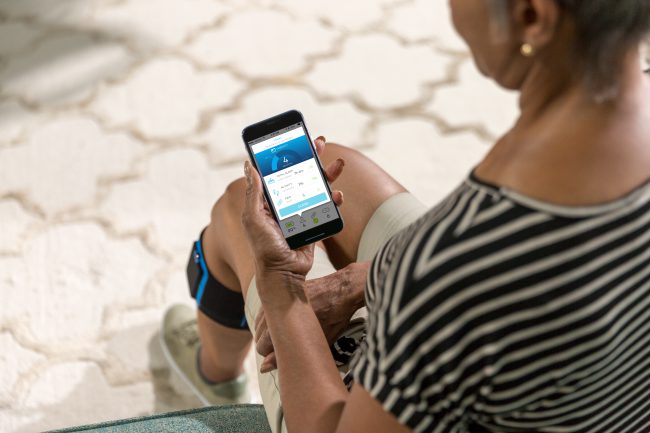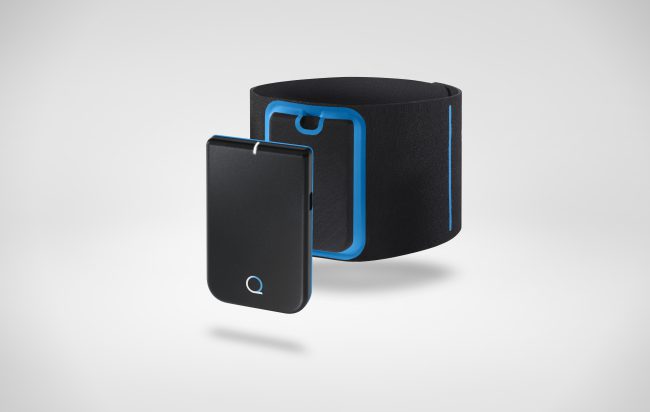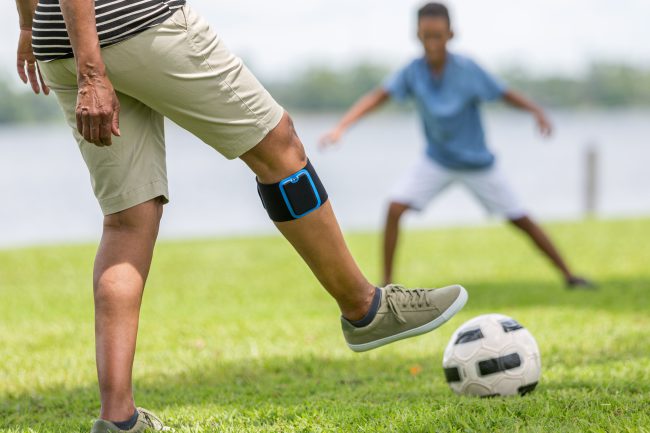
Dan recently reviewed the Quell 2.0 and found it helped with his RA pain. NeuroMetrix has added new functionality to the Quell app to help users achieve even more relief from chronic pain. Quell 2.0 and the upgraded app make for the first wearable technology to utilize machine learning “to deliver unprecedented personalization for the treatment of chronic pain.”
Quell 2.0 is a Class II medical device which delivers “an advanced form of transcutaneous electrical nerve stimulation (TENS).” You wear Quell on your leg, regardless of where your pain actually originates from. Quell sends “neural pulses to the brain that trigger a natural pain relief response in the central nervous system.”
Quell attaches to your leg on a soft, flexible band. The actual Quell device is about the size of a credit card, so it is possible to wear it under your clothing all day without anyone being wise to it.
A new “Intensive Therapy” option will be added to Quell 2.0 that delivers intensive nerve stimulation concentrated into a 15-minute session. This therapy option will give Quell users another choice for obtaining pain relief, one that may act faster than standard Quell therapy. No other wearable TENS device has the electrical power to consistently provide Intensive Therapy. The Quell Relief app makes using both Intensive Therapy and Standard Therapy seamless, to achieve the best possible pain relief for each individual.

The Quell 2.0 has a battery life of up to 25 hours, and it is “the only wearable pain device FDA cleared for day and nighttime use and has been designed for multiple types and sources of chronic pain. After a simple set up, Quell will automatically deliver therapy and is so smart that it will adapt therapy throughout the day. For the best results, it is advised that Quell be used daily for a minimum of 3 therapy sessions per day. In a published study, 4 out of 5 users reported improvements in their pain.”
The newly added Therapy Coach combines goal setting, real-time feedback, educational content, and motivational messages to encourage daily use of Quell to help new users maximize results. Additionally, its intuitive design allows users to personalize therapy to their individual needs and track progress, including measurable outcomes of success such as reported pain levels and changes in sleep and gait, using the accelerometer in the device.

Quell 2.0 is packed with sophisticated therapeutic intelligence, delivering on the promise of AI. These algorithms are derived from the application of machine learning to millions of data points from over 70,000 chronic pain suffers in the Quell Healthcloud. The process evaluates demographics, health conditions, pain levels and characteristics, device utilization and objective measures of sleep, activity and gait from Quell users to power truly personalized treatment.
Quell is smart enough to adjust a user’s therapy based on manual intensity changes, body position, and sleep movements. Quell can even adapt to changes in the local weather, providing the user alerts and the option to increase dosage if the weather is predicted to change in a way that affects their pain!
If using opioids to help with your pain is something you want (or need) to stay away from, Quell 2.0 may be your best option. Quell 2.0’s AI-powered capabilities, “Intensive Therapy” option, and Therapy Coach will be commercially available later in 2019. You can learn more about the Quell 2.0 here.
